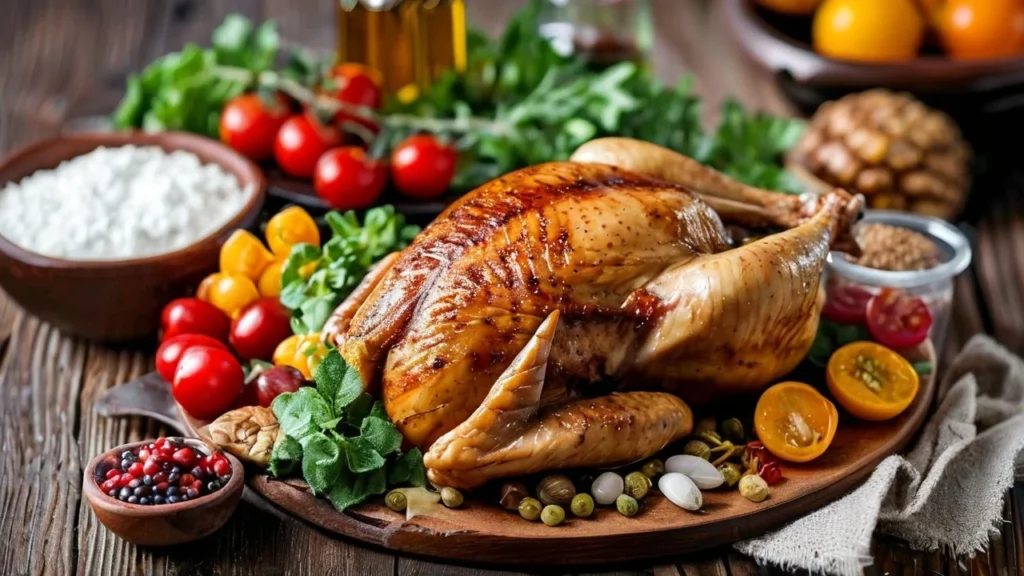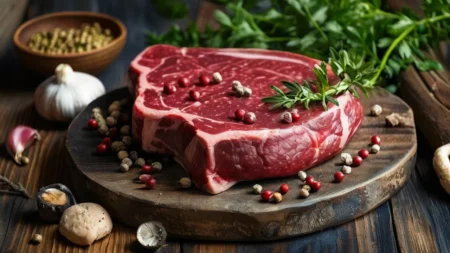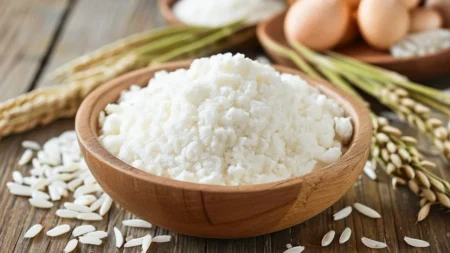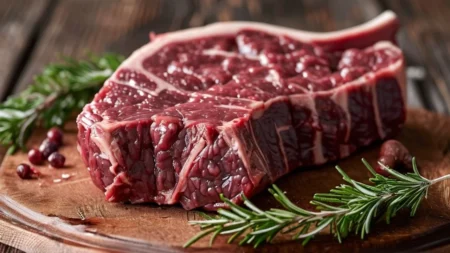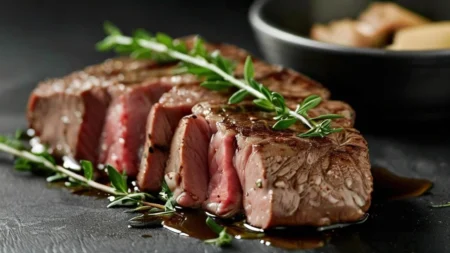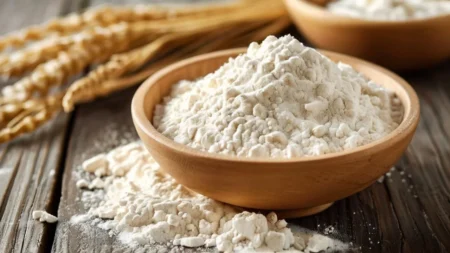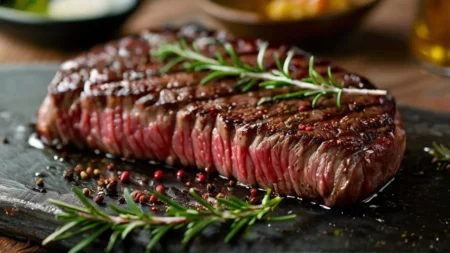Turkey: A Nutrient-Rich Protein for a Healthy Diet
Key Takeaways
- Turkey is a high-protein, low-fat meat, making it an excellent choice for health-conscious individuals.
- Rich in vitamins and minerals like B vitamins, selenium, and zinc, turkey supports overall health, including immunity and metabolism.
- It is versatile and can be used in a wide range of dishes, from roasts to ground meat for soups, salads, and sandwiches.
- Turkey meat comes in both white and dark varieties, with varying levels of fat and flavor.
What is Turkey?
Turkey is a domesticated bird, native to North America, and a popular source of lean protein. Traditionally associated with holiday meals like Thanksgiving, turkey is now enjoyed year-round as a healthful option for those seeking a nutritious and versatile protein source. Turkey meat comes in two main varieties:
- White Meat: Found in the breast, this is lower in fat and calories.
- Dark Meat: Found in the legs and thighs, this is slightly higher in fat and has a richer flavor.
Nutritional Value of Turkey
Turkey is an excellent source of lean protein, offering essential nutrients that contribute to a balanced diet. It’s particularly rich in B vitamins and minerals like selenium and phosphorus.
Table 1: Nutritional Profile of Turkey (per 100g, roasted)
| Nutrient | Amount | % Daily Value (DV) |
|---|---|---|
| Calories | 135 | – |
| Protein | 28 g | 56% |
| Total Fat | 3.2 g | 5% |
| Saturated Fat | 1 g | 5% |
| Cholesterol | 109 mg | 36% |
| Vitamin B6 | 0.6 mg | 30% |
| Niacin (B3) | 10.4 mg | 52% |
| Selenium | 26.6 mcg | 38% |
| Zinc | 1.93 mg | 13% |
Health Benefits of Turkey
High in Lean Protein
Turkey is an excellent source of lean protein, providing 28 grams of protein per 100 grams of meat. Protein is essential for muscle growth, tissue repair, and overall health. White meat turkey, such as the breast, is particularly low in fat, making it a popular choice for those looking to build muscle or lose weight.
- Scientific Insight: A study published in the American Journal of Clinical Nutrition emphasized the importance of lean protein in supporting muscle mass and metabolic health, especially in older adults.
Supports Immune Function
Turkey is rich in selenium, a powerful antioxidant that plays a crucial role in supporting the immune system. Selenium helps to protect the body from oxidative damage and infection.
Heart Health
Turkey, especially the breast meat, is low in saturated fat and cholesterol. Consuming lean cuts of turkey may contribute to heart health by reducing the risk of heart disease.
Vitamin B6 for Brain Function
Turkey is an excellent source of vitamin B6, which is important for brain health. Vitamin B6 helps the body produce neurotransmitters like serotonin, dopamine, and norepinephrine, which regulate mood and energy levels.
Turkey Varieties: White Meat vs. Dark Meat
Turkey offers both white and dark meat, each with distinct nutritional profiles and culinary uses.
White Meat
White meat, particularly turkey breast, is the leanest part of the bird. It is low in fat and calories, making it ideal for those seeking a low-fat protein source. However, white meat can be slightly dry if overcooked due to its low-fat content.
Dark Meat
Dark meat, found in the turkey’s thighs and drumsticks, contains more fat, making it juicier and more flavorful. While it is higher in fat than white meat, it is still a relatively lean protein compared to other meats like beef or pork.
Table 2: White Meat vs. Dark Meat Nutritional Comparison (per 100g)
| Type of Meat | Calories | Protein | Fat | Cholesterol |
|---|---|---|---|---|
| White Meat | 135 | 28 g | 3.2 g | 109 mg |
| Dark Meat | 175 | 23 g | 7 g | 93 mg |
Culinary Uses of Turkey
Turkey is highly versatile and can be incorporated into many dishes, whether as a centerpiece for a holiday meal or as an everyday protein in soups, salads, and sandwiches.
List: Popular Ways to Cook Turkey
- Roast Turkey: A traditional holiday dish, typically seasoned and roasted in the oven.
- Ground Turkey: A lean alternative to ground beef, often used in burgers, meatballs, and tacos.
- Turkey Breast: Often grilled or baked, perfect for sandwiches and salads.
- Turkey Sausages: A healthier alternative to pork sausages, often seasoned with herbs and spices.
- Turkey Stew: Turkey can be slow-cooked in soups and stews for a hearty, nutritious meal.
Turkey and Dietary Considerations
Weight Management
Thanks to its high protein content and low fat, turkey is an excellent choice for those on a weight management or muscle-building diet. Protein helps to keep you full longer, reducing the likelihood of overeating.
Gluten-Free and Paleo Diets
Turkey is naturally gluten-free and is a great option for those following gluten-free or paleo diets. It’s also a perfect fit for individuals avoiding red meat but still wanting to maintain high protein intake.
Low in Fat and Cholesterol
Opting for lean cuts like turkey breast is an effective way to maintain a heart-healthy diet. Its lower fat and cholesterol levels make it a suitable option for people looking to reduce their intake of saturated fat without compromising on protein.
List: Key Benefits of Turkey in Diets
- High in Protein: Supports muscle growth and tissue repair.
- Low in Fat: Especially in turkey breast, aiding in weight management.
- Rich in Nutrients: Provides essential vitamins and minerals like B vitamins, zinc, and selenium.
- Versatile: Can be used in various recipes, fitting into numerous dietary plans.
Turkey and Sustainability
Turkey farming practices have evolved to become more sustainable, with many farmers adopting environmentally friendly practices. Raising turkeys generally has a lower environmental impact compared to red meat like beef, as it requires fewer resources such as water and feed.
Organic and Free-Range Options
Organic and free-range turkey options are becoming more available, offering consumers a way to support ethical farming practices while enjoying high-quality meat. These birds are raised without antibiotics and hormones, and often have access to outdoor spaces, contributing to animal welfare.
Conclusion
Turkey is a highly nutritious, lean protein that can be incorporated into various diets, from gluten-free to heart-healthy plans. With its low-fat content, rich nutritional profile, and versatility in cooking, turkey is an ideal choice for those looking to boost their protein intake while maintaining a balanced and health-conscious diet. Whether you enjoy it roasted for the holidays or as ground meat in your daily meals, turkey provides numerous health benefits.
FAQ
1. Is turkey healthier than chicken?
Turkey and chicken are both lean proteins with similar nutritional profiles. Turkey breast has slightly fewer calories and more protein, while dark turkey meat is comparable to chicken thigh in fat content.
2. How long does cooked turkey last in the fridge?
Cooked turkey can be stored in the refrigerator for 3-4 days. Make sure to store it in an airtight container to maintain freshness.
3. What’s the difference between white and dark turkey meat?
White meat (breast) is leaner and lower in fat, while dark meat (thighs and drumsticks) has more fat and a richer flavor.
4. Can I substitute ground turkey for ground beef?
Yes, ground turkey is an excellent substitute for ground beef in many recipes, offering a leaner alternative with fewer calories and fat.
5. Is turkey a good source of vitamins?
Yes, turkey is rich in B vitamins, especially B6 and niacin, which are important for energy production and brain health. It also contains selenium, an antioxidant that supports immune function.





